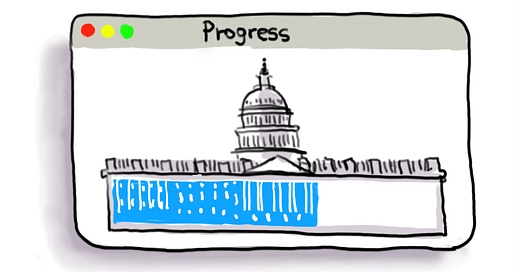It's such a funny old joke, ha ha, how do they come up with this stuff? Because pro is the opposite of con, get it?
Ironically,1 the people who like this joke don't typically seem like progressives, making them the opposite of progress, too, in a way. A lot of Congress is the opposite of progress images and merchandise seem to be on sites that lean conservative2 or libertarian—philosophies that don't seem to be about hoping the government "gets things done." To conserve means to protect, maintain, or remain, which seems at odds with progressivism, which advocates for reform. It seems odd to complain that the government can't make progress, while being against undue progress oneself.
Maybe I'm stereotyping, but I would think that people who don't consider themselves progressive would at least be sticklers for etymology. As you know, pro- means forward, and con- means together or with. Throw in the Latin verb gradi (to walk) and you get progress (walking forward) and congress (walking together).
The sense of sexual congress, a special horizontal form of walking together, comes from the 1580s. The original Latin word congressus could mean either a friendly meeting or a hostile encounter,3 both of which seem apt.
The con-4 that people think of when they say Congress is the opposite of progress is the one you hear in pro and con, which is the basis of the joke about Congress. That one, dating from the 1570s, is short for the Latin contra (against).
The good news is that if Congress really is the opposite of progress, it's because of that friendly/hostile meeting where the voices of everyone—progressive5 and conservative6 alike—have a chance to be heard.
You know, like rain on your wedding day.
I know what you're thinking, but proservative is not the opposite of conservative. There's a group by that name, focused on what it means to be a "true conservative," which is the opposite of the opposite.
See congress (n.) in the Online Etymology Dictionary.
"You bet it's a con," they also say, "crooks, all of them!" But there's an etymological problem here, too, because that con is short for confidence, so it's not the same as contra- at all.
I am not in favor of walking forward without knowing where we're going, just for the sake of walking—but I see many valuable goals ahead. That makes me a progressive. We can improve many things with measured steps together.
I understand the impulse to preserve things that are working well, and to understand how our money is spent. I am addressing pre-Reagan conservatism here; engagement with the current world of GOP politics is too much for this short post.




